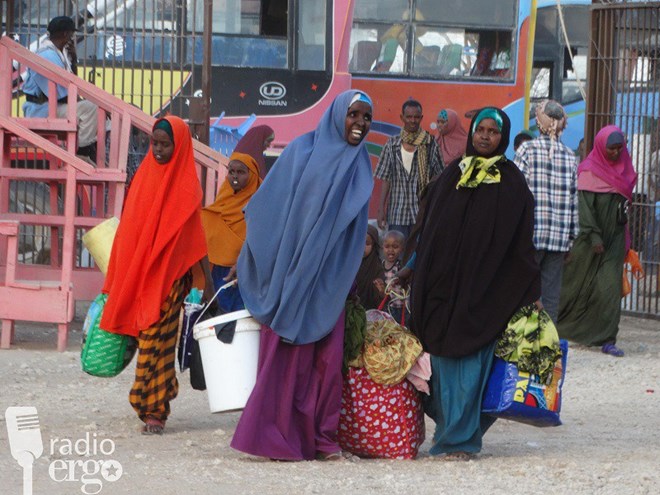
Thursday February 22, 2018

File Photo/ ERGO
Somali refugee leaders from the Dadaab refugee camps in Kenya have been taken by the UN’s refugee agency, UNHCR, on a ‘Go and See’ visit to Mogadishu and Baidoa in southern Somalia. UNHCR says the initiative is intended to inform refugees about the situation on the ground in Somalia to enable them to make informed decisions about whether to return home.
Nearly 40 refugee leaders from the Dadaab camp complex took part in the trip by UN plane. The leaders will report back to the rest of the refugee community in Dadaab by various means. There are around 230,000 Somali refugees currently living in Dadaab. Around 18,000 of them have registered for the UNHCR-led voluntary repatriation scheme.
Mursal Mohamed Abdulle, one of the leaders, left Baidoa 12 years ago. He spoke by phone from Hagadera camp in Dadaab, where he lives, to Radio Ergo’s Mohamed Hassan about his impressions after the visit to his former home.
Mursal: Our main task was to assess the security, health, education, and lives of the people who have been repatriated, to see where they live, their food, what they have been given as well as their environment. We were a fact-finding group.
Ergo: How many recently repatriated refugees did you meet in Baidoa?
Mursal: There are many of them there but I only managed to meet some of them. We saw houses constructed for 100 repatriated families, each having one room without a toilet. They had not been allocated any land, so they bought it using the money they were given as part of the repatriation process. They bought land on the outskirts of town as they could not afford to buy land in the town. They are doing fine. Everyone has a room and a title deed.
People who return voluntarily are given a package of money. For example a family of 10 is given $200 for each member. They use some of the money for transport. Once they reach home, they are given another $200. So a family of 10 gets a total of $4,000, from which they pay $500 for transport.
Where they live on the outskirts of Baidoa, the price of a plot of land is about $2,000. When these families buy land, they get title deeds from the local government. They then take the title deeds to the UNHCR, which helps them construct a one-room house made of iron-sheets. We have seen some who were very happy, although their only complaint was the lack of water.
Ergo: You only saw these 100 returnees in Baidoa, what about all the others?
Mursal: That is true. Baidoa has grown big. We were assessing land, environment, drought situation, security status and education opportunities. We were not able to visit more than this group of 100 returnees. But some others who used to live with them in the refugee camps came to see us, although they live on the other side of the town. They told us there are some lucky families that got houses whilst there are others like themselves who are yet to get houses.
When we assessed the area, we could tell it was a country that is in a recovery process. When you leave Baidoa, security is not guaranteed. There are some people who got jobs and training opportunities. The people who owned houses in the area [before they left for Dadaab] are doing better, [using the money they received] they have bought tuk-tuks, others bought taxi cabs, others have bought donkey carts.
These families get food support for the first six months and when that is finished they do food-for-work, for example they would work in road construction or construction of wells. But we noticed there is drought and water scarcity.
Ergo: There are some refugees who were repatriated and have come back again to Dadaab. Can you tell us about these people?
Mursal: True, they are here [in Dadaab] with us. There are some who were struggling with water and food scarcity and couldn’t stay in Baidoa. How do you live when you are told you need to work hard for a living? Somehow it is hard for them, as they are used to handouts and services.
Ergo: Did you see some who were fully integrated and making good money?
Mursal: Yes, some are even my relatives and others used to be my neighbours here in Hagadera. They say: “Thank God, we are not going back to the camps, we have houses, we have tuk-tuks, donkey-carts. We get food for work.”
It is also important to mention that there are hardships in Baidoa. The effects of the drought are severe. The people from Bakool [neighbouring region] and its environs are all converging on Baidoa as well.
Ergo: What did you report to UNHCR and the refugees after your visit?
Mursal: There are some people who are doing well, whilst on the other hand there are others who are returning again [to the refugee camps]. There are some people who have been assisted, whilst others have not got any help. The land has been hit by drought. The areas around the town are safe. We have given them that feedback.